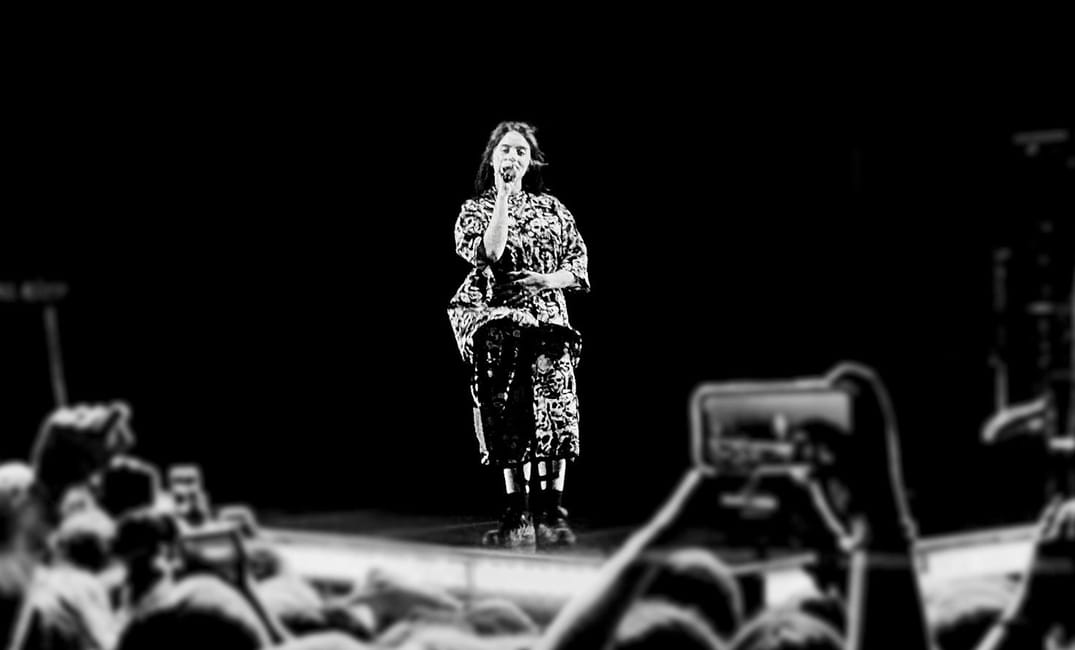✏️ Aoife Forbes
@aoifekforbes
Billie Eilish is a veteran of internet scorn. The internationally renowned singer-songwriter, winner of five Grammys, the youngest artist ever to write and perform a James Bond theme, Eilish also holds the less enviable position of having been trolled relentlessly on the web since anyone really knew who she was.
Criticism of Eilish has taken various forms; amongst other things she stands accused of making music that only teenage girls could bear to listen to (as if this were a bad thing), of being the product of privilege instead of talent (both of her parents are musicians), and of not knowing who Van Halen are (again, apparently, a sin).
As per the grimly predictable state of the internet, however, controversy about Eilish most often involves her body. She’s known for wearing clothes that are loose and long – almost every outfit she’s photographed in is oversized. Eilish has said in the past that this is something she does to protect herself from being objectified online.
A recent post on Eilish’s Instagram features, amongst photographs of a trip to Hawaii with friends, a few seconds of footage of her wearing a bikini. It has thirteen million likes. Google the words ‘Billie Eilish Hawaii’ and you will find headlines including ‘Billie Eilish strips down to her swimsuit for a steamy shower’ and ‘Billie Eilish Shares Smoking Hot Video of Herself Showering in a Bikini’.
Eilish, who has more or less pleaded with the world’s media to stop trying to sexualise her, is obviously not the only victim of this kind of unwanted online scrutiny. The topic of internet sexism seems like a tired one, in many ways, something we might just have to get used to as part of the way we live now, that young women like Eilish should accept as a side effect of fame. There’s something stand-out about this particular celebrity, however – an edge of unpleasantness which is neatly summed up by Eilish’s own Instagram bio: ‘18’.
Eilish’s 18th birthday fell in December 2019; meaning that it’s only been ‘okay’ (in the very loosest, most clinical sense of the word) for the internet to wonder like this about Eilish, to make her body the topic of forums and comment sections, for about four months. In her native California, she is still three years too young to legally purchase alcohol.
Comments on an early Instagram post of Eilish’s include ‘hot and cute at the same time’ ‘she’s waaay more fire than everyone’s girlfriend which is sick in the head’ ‘most revealing pic we got’ and ‘I finally know what shape you are’. She’s fully clothed, and 15 at the time.
The thread under her now-infamous Hawaii post bears some depressing similarities – scrolling through a selection of the comments is an uncomfortable experience, if not an unfamiliar one. The tone is often crude, sometimes threatening – a magnification of the kind of sexualised scrutiny that affects almost all women, and particularly those who publish any kind of content about themselves online.
Maybe it hasn’t occurred to the commentators in question that by insulting, objectifying and lusting after Eilish they are explicitly sexualising someone who was, until not long ago, a child. Maybe it has. Many of them have public accounts. There aren’t really any consequences on the internet. You can report a comment on Instagram, obviously, but it’s not exactly clear what this achieves, and the threatening, predatory, and sexist comments on Eilish’s account alone exist in their thousands.
It seems a little more than lazy for platforms like Instagram to rely on users themselves to police abusive content, and there is a sense of adding insult to injury when it becomes the responsibility of women in online spaces to defend the victims of objectification. Admittedly, any commitment to monitoring comment threads and reporting offensive material will be a huge and complex one, but lobbying social media providers to make at least some meaningful attempt to do so seems infinitely preferable to the existing alternative.
The only real conclusion we can draw from what’s happening to Billie Eilish is rather a predictable one – as far as the internet is concerned, overt female sexuality is a rock, and anything else is a hard place. Far more novel, and more sinister, is the blurring of norms about adulthood that is becoming commonplace place online with the sexualisation and fetishization of teenagers like Billie Eilish.
This doesn’t have to be the case, and the solution lies in culpability. It’s an obvious truth that there needs to be a sea-change in how girls and women are viewed and treated online, and it seems equally obvious that the people sexualising us without fear of reprisal aren’t going to stop when we ask them to. It’s time to call on social media platforms, and on legislators, to do better.
Thanks for reading our article! We know young people’s opinions matter and really appreciate everyone who reads us.
Give us a follow on Instagram, Twitter and Facebook to stay up to date with what young people think.

